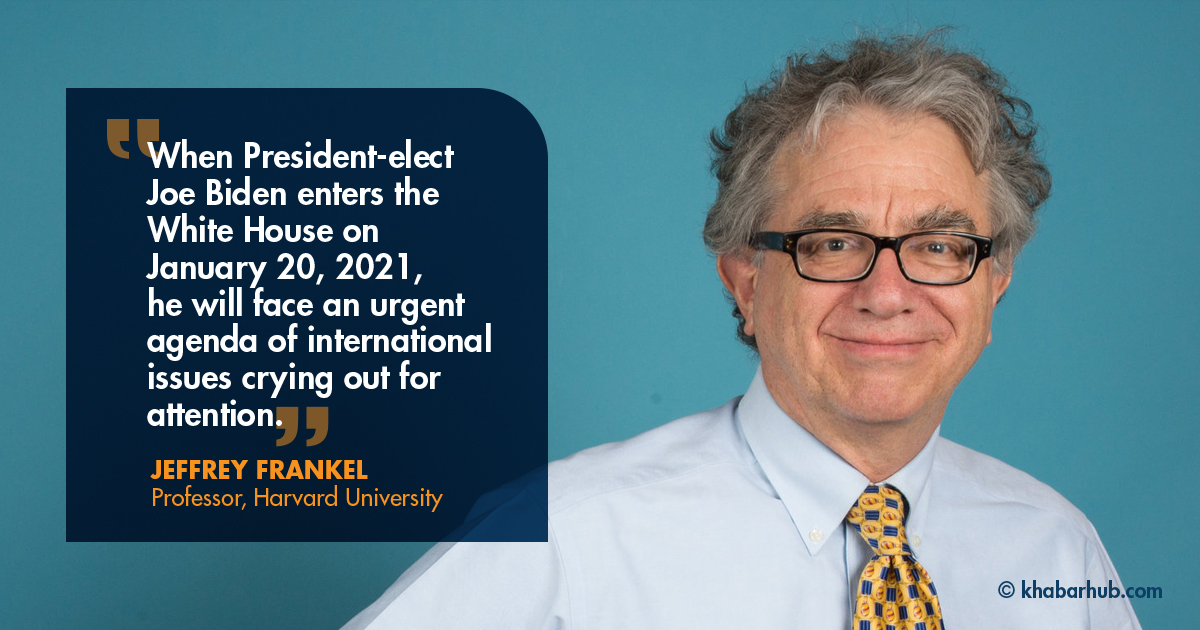Like the Joni Mitchell song puts it, “You don’t know what you’ve got ‘til it’s gone.” For example, classroom education was often deemed boring by students and obsolete by tech visionaries. Then, COVID-19 made it difficult or impossible to meet in person. Now we yearn for in-class experiences.
Perhaps the same is true of international economic cooperation. Multilateral institutions such as the World Trade Organization, the International Monetary Fund, and the United Nations agencies have long been unpopular among much of the public for supposedly encroaching on national sovereignty.
But then US President Donald Trump came along and made international cooperation well-nigh impossible. While other G20 leaders discussed pandemic preparedness at their recently concluded summit, for example, Trump evidently tweeted more false accusations of electoral fraud and then played golf.
When President-elect Joe Biden enters the White House on January 20, 2021, he will face an urgent agenda of international issues crying out for attention.
But emerging-market and developing economies (EMDEs) – especially those that already had unsustainable debt burdens before the pandemic struck – have much less room to maneuver.
The top items include the pandemic, climate change, and the global recession, which will require joint action by advanced economies on fiscal stimulus, debt restructuring, and trade.
Biden did not campaign on international economic cooperation per se; US presidential candidates never do. But he has pledged to immediately reverse Trump’s monumentally short-sighted decisions to withdraw the United States from the World Health Organization and the 2015 Paris climate agreement.
Pandemic diseases such as COVID-19 are a classic example of an international externality that individual governments can’t adequately address on their own.
International cooperation is a far more effective way to investigate local disease outbreaks and warn of global dangers; coordinate research, development, production, and distribution of vaccines or treatments; and agree on procedures for restricting or quarantining cross-border travelers. The WHO is not perfect, but it is obviously needed now.
Likewise, global climate change is the archetypal global externality. A ton of carbon dioxide emitted anywhere has the same greenhouse effect everywhere. National regulation cannot by itself correct the misalignment of incentives, owing to the free-rider problem across governments. Hence the need for an international accord like the 2015 Paris climate agreement.
Biden and other world leaders must also tackle the deepest global recession since the 1930s.
Beyond measures to address the pandemic itself, advanced economies must agree above all on joint fiscal stimulus, as they did at the 1978 Bonn summit of G7 leaders and at the 2009 G20 meetings under the leadership of the United Kingdom’s then-prime minister, Gordon Brown.
The IMF recently estimated that if those G20 countries with the greatest fiscal space simultaneously increased infrastructure spending by 0.5% of GDP in 2021 and 1% of GDP in subsequent years – and if those with more limited fiscal space invested one-third of that – they could lift global GDP by nearly 2% by 2025, compared with a boost of just below 1.2% under an unsynchronized fiscal approach.
One such goal is to reduce the need for foreign corporations to share proprietary technology with domestic partners as the price of access to China’s market.
A coordinated fiscal expansion (with substantial funds spent, one hopes, on green infrastructure investment and the fight against COVID-19) would thus help to ensure a faster global recovery of GDP and employment, and minimize the danger of a W-shaped recession.
Moreover, a simultaneous stimulus need not adversely affect any G20 country’s trade balance.
With interest rates near zero, the US and other advanced economies do not feel constrained in their ability to borrow, even as debt-to-GDP ratios rise.
But emerging-market and developing economies (EMDEs) – especially those that already had unsustainable debt burdens before the pandemic struck – have much less room to maneuver.
Many EMDEs will need to have their debts restructured. Until now, the international community’s response has mostly consisted of the G20’s Debt Service Suspension Initiative (DSSI), which was limited in scope.
The scheme kicked the can down the road by merely postponing (as opposed to reducing) debt-service obligations, and it did not include private debt.
The world’s largest economies must urgently lead and coordinate on this issue. G20 leaders recognized at their November 21-22 summit that DSSI-eligible countries need more than bilateral official debt relief. But they made little tangible progress.
Moreover, many African countries worry that well-intentioned efforts at coordinated debt restructuring will hurt their ability to continue accessing international capital markets.
The poorest countries also need new concessional loans and grants. Proposals are back on the table to issue a new tranche of Special Drawing Rights (the IMF’s reserve asset) and to direct the liquidity to emerging markets.
On trade, many Democrats will urge Biden to continue to pursue some of Trump’s objectives, but to work with US allies rather than against them.
One such goal is to reduce the need for foreign corporations to share proprietary technology with domestic partners as the price of access to China’s market.
But international trade agreements are unlikely to be high on its list of priorities, and committed devotees of the open rules-based trading system will have to recalibrate their ambitions.
An intelligent US strategy might have been to stay in the Trans-Pacific Partnership and hold out to China the prospect of someday joining if it followed the rules, which were written mostly by America.
The other TPP countries have gone ahead without the US, which could still catch up by rejoining.
But it may be too late for that. While the US was sleeping, China organized its own Asia-Pacific trade bloc, called the Regional Comprehensive Economic Partnership.
At this point, straightforward reciprocal tariff cuts may be a more promising option for the US than messy and hard-to-enforce “deep integration.”
Recent high-level appointments to the incoming Biden administration are committed internationalists. The US will presumably allow the WTO to function again.
But international trade agreements are unlikely to be high on its list of priorities, and committed devotees of the open rules-based trading system will have to recalibrate their ambitions.
Furthermore, America’s friends and allies have lost some of their enthusiasm for letting it conduct the international orchestra. But, at a minimum, they will be happy to have it back as an important and constructive player.
(Jeffrey Frankel is Professor of Capital Formation and Growth at Harvard University)
Copyright: Project Syndicate, 2020









Comment